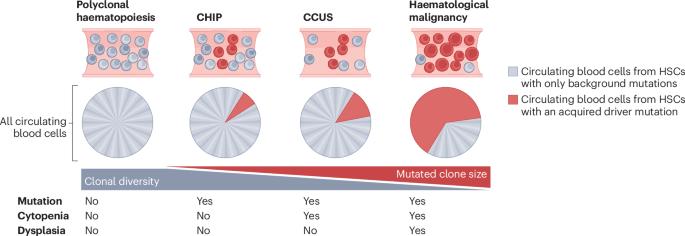Clonal haematopoiesis in cardiovascular disease: prognostic role and novel therapeutic target
IF 44.2
1区 医学
Q1 CARDIAC & CARDIOVASCULAR SYSTEMS
引用次数: 0
Abstract
Clonal haematopoiesis is the clonal expansion of blood stem cells with acquired mutations. Clonal haematopoiesis of indeterminate potential (CHIP), traditionally defined as clonal haematopoiesis driven by a pre-leukaemic mutation in at least 2% of sequenced alleles, affects 10–20% of individuals aged >70 years. Although CHIP is considered a precursor condition for haematological malignancies, population-based data suggest that the majority of CHIP-associated mortality is attributable to non-malignant conditions, such as cardiovascular disease. Observational human studies have shown that CHIP is a strong and independent predictor of the onset and progression of atherosclerotic cardiovascular disease, heart failure and arrhythmia. In addition, findings from animal experiments suggest that CHIP is causally involved in these diseases and might be a risk factor that can be targeted with therapeutics. As our understanding of the cardiovascular implications of CHIP and other types of clonal haematopoiesis rapidly expands, it has become increasingly clear that clonal haematopoiesis subtypes have substantial heterogeneity with respect to magnitude of effect and underlying mechanisms for different cardiovascular diseases. In this Review, we discuss clonal haematopoiesis as a prognostic factor for numerous cardiovascular diseases, highlight its potential as a therapeutic target and propose a potential role for CHIP in cardiovascular precision medicine. In this Review, Schuermans and Honigberg highlight the involvement of clonal haematopoiesis of indeterminate potential (CHIP) in cardiovascular diseases, such as atherosclerosis and heart failure, and discuss the emerging role of CHIP as a potential prognostic marker and therapeutic target for these diseases.


克隆造血在心血管疾病中的预后作用和新的治疗靶点
克隆性造血是造血干细胞获得性突变的克隆性扩增。具有不确定潜能的克隆性造血(CHIP)传统上被定义为白血病前突变驱动的克隆性造血,至少有2%的测序等位基因具有白血病前突变,影响着10-20%年龄在70岁的人。虽然CHIP被认为是血液恶性肿瘤的前兆,但基于人群的数据表明,大部分与CHIP相关的死亡率可归因于非恶性疾病,如心血管疾病。人类观察性研究表明,CHIP 是动脉粥样硬化性心血管疾病、心力衰竭和心律失常发生和发展的一个强有力的独立预测因素。此外,动物实验结果表明,CHIP 与这些疾病有因果关系,可能是一种可作为治疗目标的风险因素。随着我们对 CHIP 和其他类型克隆性造血对心血管影响的认识迅速加深,我们越来越清楚地认识到,克隆性造血亚型对不同心血管疾病的影响程度和潜在机制具有很大的异质性。在这篇综述中,我们将讨论克隆性造血作为多种心血管疾病的预后因素,强调其作为治疗靶点的潜力,并提出 CHIP 在心血管精准医学中的潜在作用。
本文章由计算机程序翻译,如有差异,请以英文原文为准。
求助全文
约1分钟内获得全文
求助全文
来源期刊

Nature Reviews Cardiology
医学-心血管系统
CiteScore
53.10
自引率
0.60%
发文量
143
审稿时长
6-12 weeks
期刊介绍:
Nature Reviews Cardiology aims to be the go-to source for reviews and commentaries in the scientific and clinical communities it serves. Focused on providing authoritative and accessible articles enriched with clear figures and tables, the journal strives to offer unparalleled service to authors, referees, and readers, maximizing the usefulness and impact of each publication. It covers a broad range of content types, including Research Highlights, Comments, News & Views, Reviews, Consensus Statements, and Perspectives, catering to practising cardiologists and cardiovascular research scientists. Authored by renowned clinicians, academics, and researchers, the content targets readers in the biological and medical sciences, ensuring accessibility across various disciplines. In-depth Reviews offer up-to-date information, while Consensus Statements provide evidence-based recommendations. Perspectives and News & Views present topical discussions and opinions, and the Research Highlights section filters primary research from cardiovascular and general medical journals. As part of the Nature Reviews portfolio, Nature Reviews Cardiology maintains high standards and a wide reach.
 求助内容:
求助内容: 应助结果提醒方式:
应助结果提醒方式:


